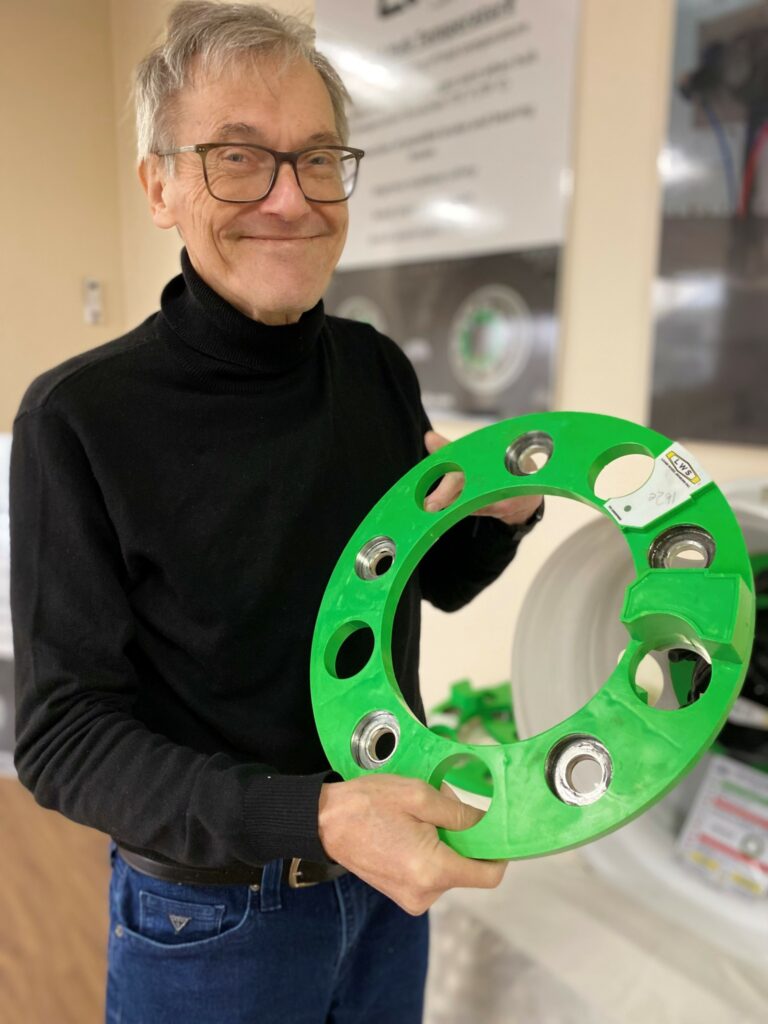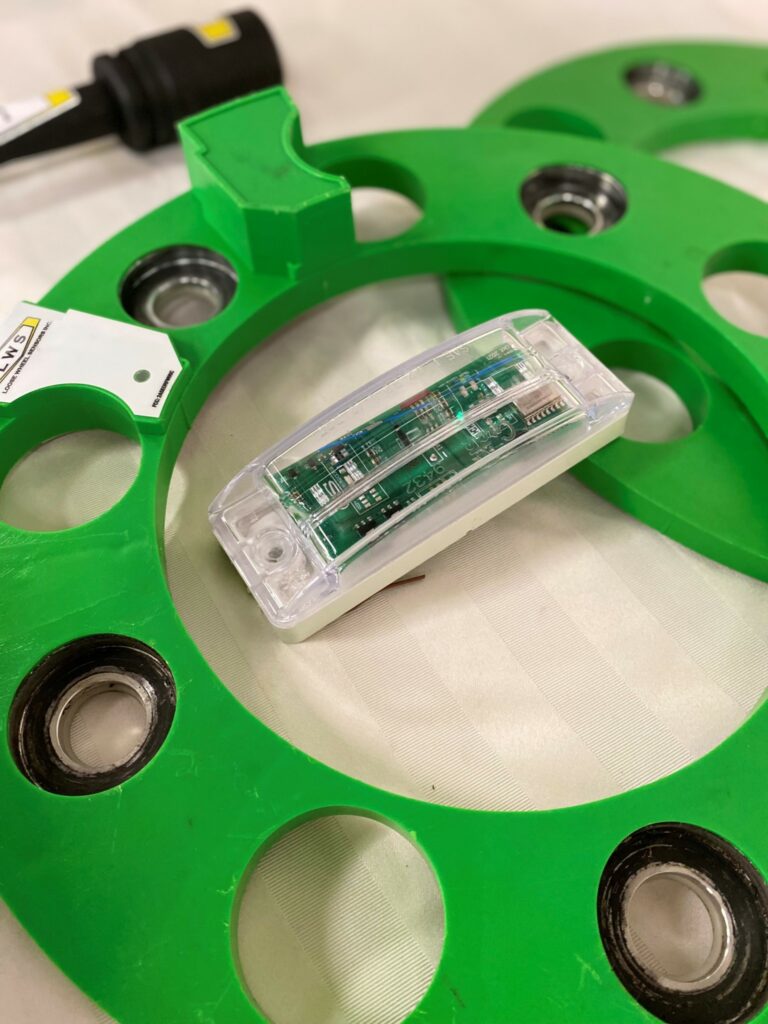Ontario company says it has potential solution to wheel-offs
An Ontario company has what it believes is a solution to prevent wheel separations.
Loose Wheel Sensors measures clamping force rather than torque, to provide an early warning to drivers when a wheel is loosening. It does this by monitoring the axial load on individual studs to ensure clamping force remains above a critical threshold.
“Nobody has ever been able to measure and monitor clamping force,” Robert Kimsto, senior vice-president with Loose Wheel Sensors told Trucknews.com during a demonstration at its Woodbridge, Ont., office.

The system’s design is simple. A Loose Wheel Sensors ring, weighing 4 lb., is installed on each wheel. It measures the axial load on each stud then sends a radio signal to a beacon located on the front corner of the trailer, visible to the driver. The rings also contain a thermal sensor to notify drivers of overheated wheel ends.
If a loosening wheel is detected, the driver is immediately notified as the beacon turns from green to pulsating red signals that indicate not only the wheel that’s loosening, but also the specific stud.
There are two diodes within the beacon. The top flashes a number of times to indicate the wheel that’s loosening, and the bottom to indicate the bolt. A reference card is attached beside the beacon so drivers or technicians can quickly interpret the message and tend to the appropriate wheel and stud.
The system is currently integrated with one inexpensive third-party telematics app, ClowdHawk, so alerts can be sent to the maintenance department or fleet manager, as well as the driver. Alert information is stored within the beacon for 30 days. Kimsto said talks are underway to integrate with more telematics platforms so fleet managers don’t have to install another app for the Loose Wheel Sensors system itself.

The system has been in testing with several fleets since January. “We had one person say ‘We don’t have any loose wheels.’ We showed them the data and said ‘Yes, you did, the wheel just didn’t fall off,’” Kimsto said of one exchange.
Several Ontario fleets are piloting the system. Marcus Hess invented the product over about four years. The biggest challenge, he said, was finding the right materials that could withstand the clamping force, and extreme weather conditions ranging from -40 F to 120 F (-40 C to 52 C).
The system is patented and can fit any bolt pattern, on both tractors and trailers. The Loose Wheel Sensors system also helps drivers conduct pre-trip inspections, Kimsto added, as it gives them an immediate warning when they start the truck of any loose wheel studs – including those that aren’t easily accessible during an inspection. And if a wheel is removed for service and improperly reinstalled, he said the driver will be notified before it’s detected during a scheduled retorque.
The system costs about $750 for two wheels and the beacon and installation is simple and doesn’t require wheel removal, the company said. It’s compatible with both steel and aluminum wheels.
More information can be found at www.lwshub.com.
Have your say
This is a moderated forum. Comments will no longer be published unless they are accompanied by a first and last name and a verifiable email address. (Today's Trucking will not publish or share the email address.) Profane language and content deemed to be libelous, racist, or threatening in nature will not be published under any circumstances.
-
I agree no offshore studs , offshore wheels or brake parts. We can have inspection in Canada the US or certain parts of Mexico or Europe
If this works trials should start and the fed gov should offer to fund a plant to build them in a rural part of Canada
-
The LWS product was under development for four years and has been extensively tested in trials and different environments. The system complies with SAE J267 standards for aluminum and steel rims. Several companies (of different sizes and services) are conducting their own pilot programs.
This may be a good idea but at $750 for 2 wheels I don’t think fleets will be willing to spend that kind of money.
-
MSRP is $750 for a tandem axle (4 wheels), including the beacon. Each additional wheel is $150 ($300 per axle). There are quantity discounts as well and financing is available if needed.
It is an intriguing concept and any Canadian tech is good for our manufacturing sector provided its made in Canada? I do agree that off shore materials are often missing the QC that should always be the top priority when it comes to safety. In Canada we often target the smaller manufactures and repair facilities on process and they over look material failure. this being said because the industry only looks at profit dollars over all for obvious reasons we are forced to keep things as cheep as possible thus forcing repair times down buy following “pre-determined” flat rates on programs supported by fleet conglomerates so the format of safety is lost to a persons interpretation of how long it takes to preform a job properly. in this business slow is fast in relation to a wheel end repairs vs a failure. you can have the best material made on the planet but if your tech rushes the repair and ultimately uses the “fast” method while installing wheels the damage is done before the unit leaves the floor regardless of the components make up stretching and incorrect torque will lead to a fail every time.
That’s great but we been down this road with other devices just another waste of money how about stop buying Chinese metal this will find interesting that most of the studs that come from china are recycled metal and they are not as tempered the same as if they were made in north America the standard for metal is a higher grade here that in Asia.
Maybe you don’t want to listen but it’s only because people think older truckdrivers know nothing but in fact most of us have a very high knowledge of the working of a truck and how most stuff is made.